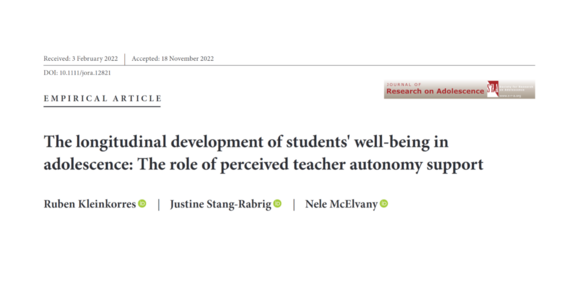The Longitudinal Development of Students' Well-Being in Adolescence: The Role of Perceived Teacher Autonomy Support
- News
- Publications

Kleinkorres, R., Stang‐Rabrig, J. & McElvany, N. (2023). The longitudinal development of students' well‐being in adolescence: The role of perceived teacher autonomy support. Journal of Research on Adolescence. doi.org/10.1111/jora.12821
How do different facets of students’ well-being (satisfaction with school, enjoyment of school, self-rated health, and social integration) develop over the course of secondary school and is this development influenced by the extent of autonomy support provided by the teacher? These questions were addressed in the paper "The longitudinal development of students' well-being in adolescence: The role of perceived teacher autonomy support".
Using a sample of 3446 students in grades 5 through 9, it was shown that satisfaction with school, enjoyment of school, and self-rated health decreased over time, while social integration remained stable. Perceived teacher autonomy support also declined between grades 5 and 9. Furthermore, baseline levels of perceived teacher autonomy support and facets of well-being were positively related. Finally and most importantly, the results indicated that changes in perceived teacher autonomy support were positively associated with the development of satisfaction with school, enjoyment of school, and self-rated health, but not social integration.
The findings suggest that perceived teacher autonomy support plays an important role in the development of students' well-being in adolescence.






